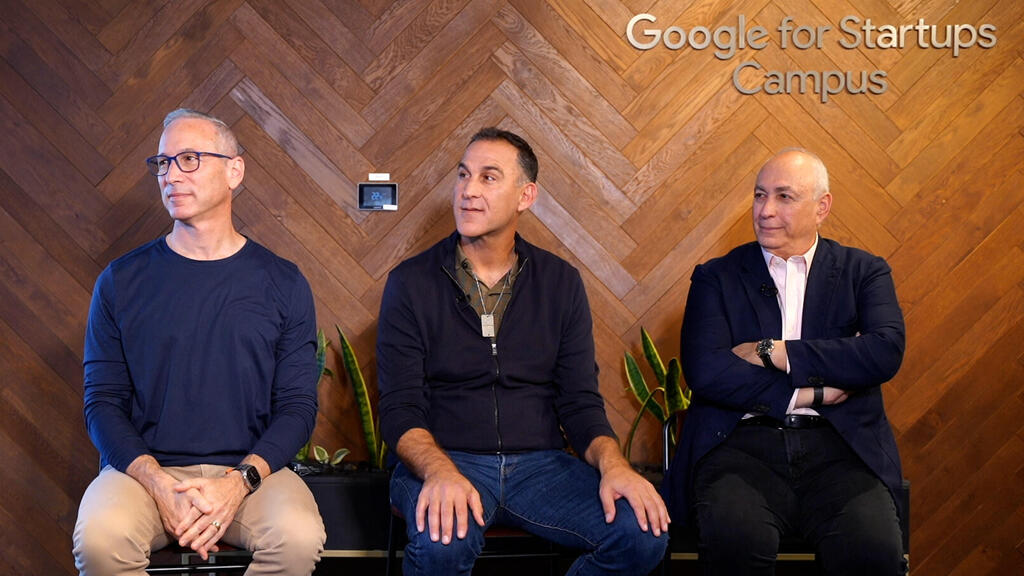
"Every entrepreneur faces pressure to leave the country. What keeps them here is Zionism"
Chemi Peres, co-founder of VC fund Pitango, Daniel Schreiber, CEO and co-founder of Lemonade, and Barak Regev, Country Director of Google Israel, discuss the symbiotic relationship between innovation, growth, and economic prosperity in Israel's high-tech landscape
"The high-tech industry has realized that, beyond its role in creating a strong economy in Israel, it must be involved in shaping a better country than before the events of 2023," said Chemi Peres, co-founder of venture capital fund Pitango and chairman of the Peres Peace Center, during the inaugural day of Google and Calcalist’s Startup Week. "I believe we will see leadership emerging from high-tech, leading Israel to much better places. High-tech professionals engaged in civil activities during the war when it became evident that the state was not functioning. A significant portion of the quality work invested in the industry will now be directed toward creating a better country."
Daniel Schreiber, co-founder and CEO of Lemonade, emphasized that "high-tech is the driving force of the Israeli economy, but we must not take it for granted. Hundreds of thousands work in the industry, billions are invested, but the beating heart of Israeli high-tech is the startup, and its essence lies in the entrepreneurs who traverse the globe and build connections. There are a limited number of people who truly innovate, and even fewer who will succeed significantly in impacting the local GDP. Every entrepreneur faces pressure from day one to leave the country, and many do, hence the fragility. What keeps them here is Zionism, an ideal, and the desire to establish both a home and a business in Israel. They need to believe in the righteousness of their path and in the future. This belief was jeopardized by the judicial reform. Investors seek a stable economy, a robust legal system, and a tax system that remains stable. Currently, the resilience of the high-tech industry is strong, but the problem is strategic. If investments and initiatives in Israel decrease in the coming years, we will feel the effects in five years."
Barak Regev, Country Director of Google Israel, commented on the challenges posed by the war. "There was a surge in investments, IPO, and recruitments during the pandemic, and the Start-up Nation's position was stronger than the rest of the world. We anticipated a decline, but then the political situation and the war ensued," he stated. "While we all project resilience, motivation, and Zionism, international company leadership evaluates three parameters: the talent base, where Israel excels, the cost base, and stability. However, we project instability, so it's crucial to demonstrate capability even during unstable times. This is highly impressive to those abroad. Nevertheless, there's a decline in investments, and in 2023, there were fewer new entrepreneurs and companies compared to previous years. We'll feel the impact in two or three years if we fail to address it."
"In three decades, high-tech has reached an extraordinary milestone," Peres added. "2021 marked the peak of a decade in which approximately $100 billion were raised, doubling the industry's output, and witnessing the emergence of a new generation of Israeli entrepreneurs. When the dust settles, we'll witness entrepreneurs returning with renewed vigor, and in the next decade, we'll witness incredible companies in Israel. I remain optimistic."
Lemonade is focused on the U.S. market. To what extent does its Israeliness play a role?
Schreiber: "Lemonade is thriving with a 55% increase in revenues, and the business is somewhat disconnected from the situation in Israel. I'm less optimistic than my colleagues. We face pivotal decisions at both the individual and state levels, giving rise to many concerns."
Barak, the presence of global companies is crucial. How does this impact Google?
"What transpired will motivate a new generation of leaders, fueling my optimism. Since October 7, Google Israel has successfully carried out all projects despite having many reservists in the IDF. We're conveying this message upwards. Eighteen percent of the high-tech workforce is from international companies, and our presence is vital as it fosters investments and provides a platform for companies."














